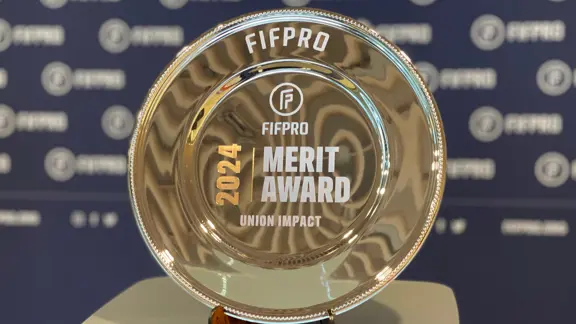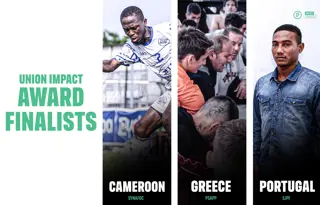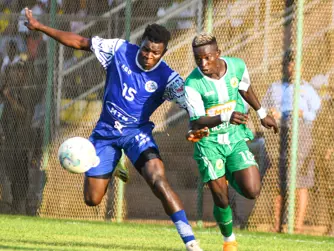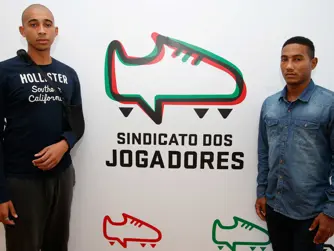News
2024 Union Impact Award: Get to know the nominees

- FIFPRO member unions will vote to pick the winner of the 2024 Union Impact Award during the upcoming FIFPRO General Assembly
- Through the Union Impact Award, FIFPRO pays tribute to all unions initiating projects that benefit their own membership and inspire fellow player unions
- Take a look at the three player unions nominated for the award
The player unions of Cameroon, Greece and Portugal are the three finalists for the 2024 Union Impact Award. During the upcoming FIFPRO General Assembly, member unions will vote to pick the winner of this special recognition.
Each day around 70 player unions affiliated to FIFPRO work to improve the wellbeing of professional footballers around the world. Various organisations launch their own projects designed to protect players and through the Union Impact Award, FIFPRO pays tribute to all unions initiating projects that benefit their own membership and inspire fellow player associations.
The three finalists were picked by FIFPRO’s selection committee consisting of International Trade Union Confederation Director Todd Brogan, FIFPRO’s ED&I Manager Erica Puppo, and representatives of each FIFPRO division: Desmond Maringwa (Zimbabwe, Africa), Kathryn Gill (Australia, Asia/Oceania), Steven Bryce (Costa Rica, Central and North America), Mila Hristova (Bulgaria, Europe) and Gamadiel Garcia (Chile, South America).

On Tuesday 26 November, member unions will vote to decide which of the three finalists will win the Union Impact Award. Take a closer look at the three player unions nominated for the award.
Cameroon: A barometer to fight non-payment
Player union Synafoc created a new way to raise awareness about the problems with non-payment in Cameroon. Many players find themselves in a precarious situation due to non-payment of salaries, bonuses and the lack of action from the football federation which often fails in enforcing decisions by judicial bodies.
The union's project is called the ‘Barometer’. Each month the union sends a survey to players at all teams in the top two men’s divisions and the top women’s division, who report what the status of their payment is. The union then publishes the results of this player survey during a monthly press conference.
This project had three short-term goals:
- Inform stakeholders and public about the players’ poor working conditions
- Explain the actions Synafoc intends to implement to restore players’ rights
- Inform players about the means available to them in case of non-payment
Naturally, Synafoc's long-term goal is that players’ salaries and bonuses are paid on time. According to Synafoc President Geremie Njitap, the Barometer exceeded the desired objectives.
“It is now an expected and appreciated event,” he said. “Club presidents who snubbed us in the past now call us to justify themselves to avoid being indexed in the Barometer.
“Players now know which clubs are serious and which are not, so for them the Barometer is an authentic decision-making tool. And the football association is now showing a little more interest in applying its own regulations to force clubs to respect their commitments.”
Players in Cameroon urge clubs and FA to collaborate and solve non-payment crisis

Greece: A documentary that shows players’ reality
Greek player union PSAPP created a three-episode documentary ‘Chaos’ about the reality a substantial number of professional footballers in the Greek second division face: no money, no food, miserable working conditions and dishonest clubs.
“For me, Chaos is the injustice experienced over the years by second division players,” explained PSAPP Chairman Giorgos Bandis. “The idea of the documentary came up after many years of us protesting and sending letters to institutional bodies. Unfortunately, no one listened, and that’s why we decided to put all this chaos into a documentary, so that every ordinary Greek citizen can put themselves in the shoes of the footballers and understand what’s happening.”
The union's aim was to use the documentary as a negotiating tool to improve working conditions because for other stakeholders it would be difficult to deny what is now visible for everyone.
The documentary had an immediate impact. The union even noticed there were fewer problems in the second league during the 2023/24 season: the championship started on time in September instead of late October or November as was the case in previous years, while The Greek Football Federation amended licensing regulations and the Regulations on the Status and Transfer of Players. What’s more, during the season, no club went bankrupt, compared to two clubs going out of business during the previous season.
Portugal: Arranging better protection against human trafficking of footballers
Portuguese union SJPF has been supporting victims of human trafficking, illegal immigration and fraud since 2015. The support is wide-ranging – from legal assistance in the courts to providing food, accommodation or financial help for return tickets – and the union has helped over 55 people.
After a scandal involving an academy holding 30 underaged players against their will, the union reached out to the Portuguese government to introduce new protective measures. They published ‘Dossier Human Trafficking’ to inform the general public about the union’s efforts to protect and support these players, and about the proposals the SJPF had made to improve the situation.
The union’s activities led to the government reviewing its law and regulations, to prevent more foreign players falling victim to these human trafficking schemes. New requirements were imposed on clubs and academies to be able to host foreign players and the union was part of a working group set up by the Secretary of State for Youth and Sport that focused on solutions to combat the problem.
“It is one of our union's main issues, even though it is not really a specific football topic,” said SJPF President Joaquim Evangelista. “However, we believe that all football stakeholders have a responsibility to tackle this problem and to work together with the government and other organisations.
“Our members support this activity, and many of the players we supported through the years have become union members after a successful social reintegration. They are still in touch with us and regularly show their gratitude for the positive change in their lives. That is what this is about – the social impact is significant.”
How the Portuguese union is tackling human trafficking in football

Honourable mentions for Kenya and Lithuania
Even though they did it not make it as finalists for the award, the player unions of Kenya and Lithuania also nominated themselves for the Union Impact Award.
Kenyan player union KEFWA created a special programme to support players with mental health problems, while Lithuanian player union PFA Lietuva launched a project that connected players struggling with mental health issues with a sports psychologist.
